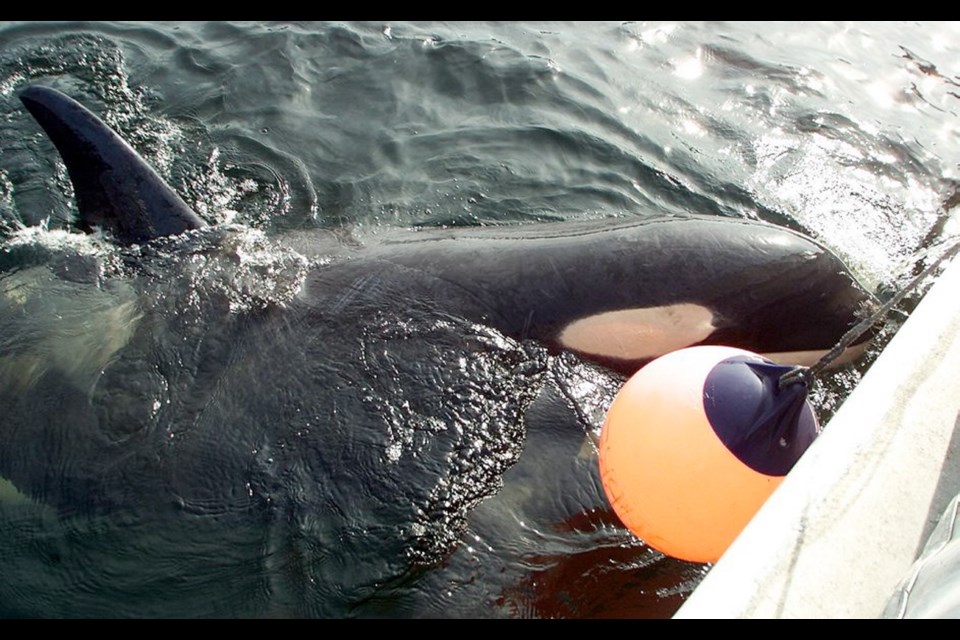As 20-month-old Christopher marches across the hardwood floor of his Sidney Island home, his orca slippers emit the plaintive sound of a killer whale call.
For parents Suzanne Chisholm and Mike Parfit, it is one more reminder of the story that has taken up almost nine years of their lives.
“I could never have envisioned that we would spend all these years on this,” said Chisholm, a documentary filmmaker.
The release this summer of Parfit and Chisholm’s book, The Lost Whale: The True Story of an Orca Named Luna, may be the last chapter of the couple’s involvement with the young killer whale that turned up alone in Nootka Sound seeking human contact.
But Parfit and Chisholm’s time with Luna changed their lives forever — and they believe others were similarly affected during the controversy-ridden years the whale spent in Nootka Sound.
The book, like Parfit and Chisholm’s award-winning documentary films, Saving Luna and The Whale — narrated by Ryan Reynolds and executive produced by Reynolds and his then-wife, Scarlett Johansson — does not answer the many questions that were raised by Luna’s short life, which ended in March 2006.
Instead, Parfit said, the central theme is empathy.
Those who were stirred by looking into Luna’s eyes have moved into the cutting edge of animal science, he said.
“It’s acknowledging that there is an awareness. This whale was just as aware of living as we are.”
A world-class story
Chisholm and Parfit, a journalist who has written for National Geographic and the Smithsonian, arrived in Gold River, on the west coast of Vancouver Island, in 2004.
They were there to tell the story of the young whale that had turned up three years earlier after becoming separated from his pod.
Fans of the friendly whale were enamoured by Luna’s squeaks and whistles, his habit of asking for his tongue to be rubbed and his antics around boats. Others regarded him as a nuisance who was likely to cause an accident, while members of the Mowachaht/Muchalaht First Nation regarded Luna — who they called Tsu-xiit — as an embodiment of their former chief.
In 2004, after years of debate, Fisheries and Oceans decided to try to capture Luna and reunite him with his pod.
But there were suspicions that the real agenda was to put Luna in an aquarium, and the operation was fraught with emotion.
It was a world-class story, Parfit said.
The capture was ultimately foiled by members of the Mowachaht/Muchalaht First Nation, who led Luna away from the pen. That was followed by a government crackdown on anyone having contact with the whale — and Chisholm and Parfit found they were turning from journalists into advocates.
They rented an apartment in Gold River and, as contracts for short films and a book materialized, they spent an increasing amount of time with the whale.
It soon became obvious that most of the contact was initiated by Luna, not people. Parfit and Chisholm became convinced that the whale’s best chance of survival was to replace his chaotic interactions with planned regular contact with people he could trust. The hope was that he could eventually be led out of Nootka Sound to rejoin his pod.
“Our views changed by 180 degrees,” Parfit said.
Lessons from Luna
Tragedy struck in March 2006 when the whale was hit by the prop of a tug during a storm.
The death is still difficult, though it has become easier to think of all the things people learned from Luna, including about friendship and loneliness, Chisholm said.
“There is something universal about Luna’s abilities to connect with people,” she said.
“When you think of our whole relationship with whales, it is one of the few good news environmental stories. Most societies have moved past killing whales.”
Luna’s story did not have a happy ending, Parfit said. “But people come away thinking more powerfully about the love than about the loss.”
> The Lost Whale is published by St. Martin’s Press.



